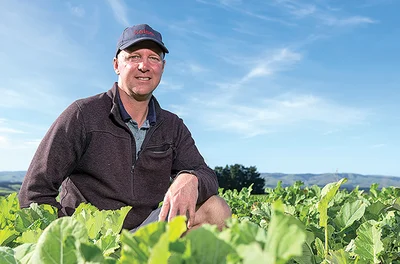Farmers focused on wintering well

Farmers Ewen Mathieson and Ben Tosswill are working hard to protect their stock and the environment, by wintering well during the coldest months of the year.
Traditionally, July brings chilly temperatures, wet weather, and an increased risk of snow. To help farmers stay on top of these challenging conditions, Southland dairy farmer Mathieson and Hawke’s Bay sheep farmer Tosswill are sharing their experiences of managing winter grazing.
Speaking on a DairyNZ podcast, both Mathieson and Tosswill agree that planning ahead, developing contingency plans, and carrying out daily checks are key to providing good animal care, protecting the environment, and minimising stress for people and animals over winter.
“Having a wintering plan helps identify risks like slopes, water sources, and different soil types which helps us to plan our winter grazing to reduce the risk of contaminant and sediment runoff,” Mathieson said.
“Planning allows us to think through the different scenarios that could occur over winter and prepare for them. It helps reduce stress and allows you to get a better night’s sleep,” Tosswill said.
Mathieson has developed small sawdust pads on his farm to provide cows with a comfortable space to move to and lie on in bad weather.
“Cows need to be able to lie down while they are digesting feed,” Mathieson explained.
“They need to express their natural behaviours and lying down is an important part of this.
“With the new regulations coming in next winter, North Island farmers also need to have a wintering plan and understand how practices affect the environment. We developed our plan for this year and are still learning about our impact,” Toswill said.
Mathieson said a particular focus on his farm was checking animals regularly – once or even twice daily.
“This helps us catch issues early so that small issues don’t escalate into bigger problems.”
DairyNZ’s head of the South Island, Tony Finch, said during July and August the weather could be very cold and unpredictable, and farmers needed to keep up their focus on caring for stock right to the end of winter.
Last winter, 89 per cent of farmers developed a contingency plan to protect their animals and the environment in bad weather.
Finch said it’s not too late for farmers to develop a Plan B if adverse weather strikes, using DairyNZ’s template.
“If you do have a Plan B, check your team understand when to action it.”
Beef + Lamb New Zealand’s environmental policy manager Heather McKay said the wintering grazing module in Beef +Lamb NZ’s farm plan would help farmers identify risks and take action to mitigate them.
- By Pat Deavoll
